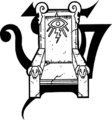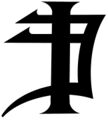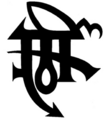Mage: The Awakening
| Mage: The Awakening | ||
|---|---|---|
| RPG published by White Wolf / Onyx Path |
||
| Rule System | Storytelling System | |
| Authors | Justin Achilli et al | |
| First Publication | 2005 (1st Edition) 2016 (2nd edition) |
|

Mage: The Awakening is the New World of Darkness version of Mage: The Ascension. They basically removed all the cool diverse traditions and organizations from the old one and substituted vague, indeterminate, inscrutable new ones. Much more emphasis on the fate of the real world, now that Mages no longer have their own special spirit world to care about (LOL Astral Realms). Mages Awaken and find that (according to some of the earlier fluff - this gets pushed by the wayside later) they're the inheritors to Atlantis. The Seers of the Throne (a version of the Mage: the Ascension Technocracy) are out to get them. Have fun eating Paradox like a chump!
Neckbeards hate it so much that they play it more than they did the old one, and people who barely ever played the old one but felt entitled to an endless, non-playing discussion circlejerk feel sad that the expertise they developed arguing about a particular imaginary world has been reduced to its actual, marginal social value. The second edition has since fixed up the fluff to make things more flavorful, though.
This wiki has a template for people who want to host MtA character sheets on this wiki.
The Crunch
It's a fucking chore trying to understand these rules straight out of the book.
As it goes with White Wolf, the book itself jumps all over the place when it comes to explaining both Fluff and Crunch. Rules for casting magic can be found in sections about awakening and vice versa. Not only that, but it doesn't help that the entire wording of rules in the book goes along the lines of "this doesn't matter and is abstract but also important," while burdening the newbie with additional information that they shouldn't have to worry about just yet.
All this means you better pray to Tzeentch that he puts you in a really understanding group (or one made up of similarly new player) with a GM who knows what the fuck is going on and is able to clearly explain the rules and can help you with casting the spell you want to cast.
Most of your first sessions will be spent adding up and subtracting the numerous amount of dice you'll need in order to cast spells and also buff them so that they can actually DO something, and if you've got a shitty GM, referring to the scattered rules of magic that are found all throughout the book, one which doesn't have a GOD DAMN INDEX!!!
That being said, though, once you get used to the layers of complexity and the mechanics of it all, you have quite the comprehensive magic system that allows for some fun adaptation and dickery and still manages to be less complicated than its oWoD counterpart. The flexible and abstract depictions of magic means that you can really do anything with magic and also means that you can imagine how magic looks in your own head, and also means that spells aren't bound to their simple descriptions.
Just because it's a level one spell, doesn't mean it's useless at higher levels.
Once you get the right amount of Yantras, dedicated tools, power and other such aids, you can turn a passive first level spell into a real magic monster, just by roiding it up a little.
All in all, it's a complex, but worthwhile system, and it's better than its predecessor.
Awakening
Mages come to be when an ordinary person going about their business suddenly undergoes an Awakening, in which their soul goes a-walking among the Supernal Realms and inscribes their name on a Watchtower located there. It's not unlike Plato's Cave allegory, except leaving graffiti outside of the Cave gives you hax magical powers. After having done so, the person is forever Awakened to an understanding of the truth of the world.
Supernal
The Supernal is the metaphorical fire and objects (which we'll call symbols, from now on) that cast the shadows in Plato's cave, with the shadows here being the 'Fallen' World where everyone lives and dies. The reason it's called the Fallen World is because while it and the Supernal used to be connected, there's now a whole (un)realm of (un)reality called the Abyss between the Supernal and the real world that acts as the source of Paradox due to essentially being the anti-Truth. This happened because eleven assholes-turned-symbolic Truth didn't want anyone else to get a share of their pie. The eleven god-assholes became symbols of Tyranny; the mages call them the Exarchs (Greek for 'ruler from outside'), whom the Seers of the Throne serve because they want to be on the winning side.
Now you're probably asking "What are the Supernal Realms then?" The thing about the Supernal is that if you enter it willy-nilly you get obliterated, as in 'never-existed' obliterated- the pure Truth it embodies simply absorbs the truth of your own existence. The Watchtower you Awaken to filters the Truth, creating a realm in which a person can Awaken without being deleted from reality. In fact this is how Archmasters enter the Supernal, by imposing their own vision into it.
So to make things simple, the Supernal is the source code for reality, with the realms being programming languages, and the Exarchs are hackers that accidentally released a virus called the Abyss that threatens to wreck it all.
Normal humans, or "Sleepers", are not capable of perceiving Awakened magic because they carry shards of the Abyss within their souls; if they witness Supernal magic, they are compelled to forget or rationalize it away since the Abyss's influence in the Fallen World renders the Supernal truth unknowable to non-Awakened. Additionally, the presence of Sleepers increases the risk of Paradox as they unintentionally allow the Abyss to corrupt the Supernal symbols a spell uses, much like the Disbelief of old. Mages debate the exact origins of what they call Quiescence, but most believe it is how the Abyss prevents people from Awakening, or perhaps how the human mind prevents itself from going insane over being confronted with the Lie.
Some people (including all other supernatural beings) are considered "Sleepwalkers": they are not capable of Awakened magic due to an inability to see the Supernal, but they are still able to see past the Lie well enough to prevent them from triggering the effects of Quiescence.
Paths
| Path | Primary | Inferior | |
|---|---|---|---|
| Gross | Subtle | ||
| Acanthus | Time | Fate | Forces |
| Mastigos | Space | Mind | Matter |
| Moros | Matter | Death | Spirit |
| Obrimos | Forces | Prime | Death |
| Thyrsus | Life | Spirit | Mind |
There are five Paths which one normally Awakens to. These determine your two favored Arcana (the replacement for the Spheres), as well as the Arcana you're worst at. Each Path corresponds to one of the Supernal Realms and has one 'Gross' (obvious) and one 'Subtle' primary Arcana, and a third arcana which is 'inferior'.
- Acanthus: The Enchanters entered Arcadia and found the Watchtower of the Lunargent Thorn. Not the same one as the one these poor bastards escaped from, though the Changelings would prefer it if these mages didn't keep trying to test that theory. Anyways, they navigated through the thorns and resolved to change the destinies they once thought to be immutable even while accepting that every decision they made would have world-changing consequences. Acanthus Mages have the primary Arcana of Fate & Time, with the inferior Arcanum of Forces. Acanthus are stereotyped to be free spirits and fickle artsy types, with a little bit of the trickster archetype thrown in for good measure.
- Mastigos: The Warlocks traversed Pandemonium to reach the Watchtower of the Iron Gauntlet. Their awakening was hell, very literally. They faced down the inner demons that had dominated their lives and either outwitted, out-gambled, or otherwise got the better of whatever was in there with them, thus taking command of their vices. Mastigos have the primary Arcana of Mind & Space, with the inferior Arcanum of Matter. Mastigos are stereotyped to be diabolical and manipulative, with an eye for identifying people's weaknesses.
- Moros: The Necromancers walked in Stygia, the Platonic ideal of death (as opposed to the Underworld, which is a shithole), and reached the Watchtower of the Leaden Coin. They let go of the things that weighed them down and embraced the process of change that affects all that exists. Moros have the primary Arcana of Matter & Death, with the inferior Arcanum of Spirit. Moros are stereotyped to be dour, resolute, and down-to-earth.
- Obrimos: The Theurges wandered through the Aether (aka Not-Heaven) to get to the Watchtower of the Golden Key. Their Awakening was all Old Testament Ezekiel - tongues of fire, wheels studded with eyes, seraphim chanting hymns to God, the works- all stemming from an intuitive leap of understanding that allows them to bring order to the imperfections of the Fallen World. Obrimos have the primary Arcana of Forces & Prime, and the inferior Arcanum of Death. Obrimos stereotypes paint them as zealous and devoted champions of ideals or whatever force they consider to be "the Divine", but prone to arrogance.
- Thyrsus: The Shamans encountered the Primal Wild and found the Watchtower of the Singing Stone. They took a walk on the wild side and learned to understand the language that the world spoke to them in, and became what is basically the walking manifestation of nature: primordial, red in tooth and claw, and interconnected with all life. Thyrsus have the primary Arcana of Life & Spirit, with the inferior Arcanum of Mind. Thyrsus stereotypes depict them as passionate and impulsive, sometimes to the point of seeming uncouth.
-
Acanthus
-
Mastigos
-
Moros
-
Obrimos
-
Thyrsus
Other Paths
The Chronicler's Guide has a 6th Watchtower of Brass and Flame (Spirit & Forces), along with the option of 10 Supernal Realms each with their own Arcanum, or possibly even an additional 20 different paths around two ruling Arcana for the Seers of the Throne. The Tremere claim the existence of a long-destroyed Sixth Watchtower of Fallen Blood that now only produces monsters (perhaps an Abyssal Ziggurat?), as well as a Seventh Watchtower of the Soul which has all the Subtle Arcana in a unified form as Ruling. Introduced in Imperial Mysteries within Imperium, is an ultimate ability that can create a new Realm, Watchtower, or even another Celestial Ladder.
Factions
The Pentacle Orders
Originally starting as the Diamond Order, which descended from the four dominant philosophies among the Awakened during the time of Alexander the Great's Empire, the first four factions were joined by the Free Council, then Nameless Orders that united under the banner of Sleeper culture, at the turn of the 20th century after the Seers asked them to join forces against the Diamond Order. While the Free Council is still a bit distant from their peers, the Diamond Order has now become the Pentacle Order. The five factions are:
- The Adamantine Arrow: Challenge is Magical. The Mage army. They teach magical kung-fu and shit. ZAP MUTHAFUCKA! They believe existence is war, which leads to infighting for dominance or just practice, with themselves or with other factions. They actually get along great with the other Orders, because 90% of their schtick is protecting other mages. Honaraburu.
- The Guardians of the Veil: Magic is Fragile. They're the Mage secret service. They keep shit that should stay hidden, hidden. Particularly from Sleepers - they believe that whenever they witness magic and allow Quiescence to take hold, a little bit more of the Abyss escapes into the Fallen World. They oppose the Mysterium, because they think magic should be hidden and the unworthy should be prohibited from becoming mages, which is far too much like the Seers than they'd like (the main difference is that if the Guardians see you Awakening despite them, they presume you are worthy until shown otherwise). They're one of the few Orders that think there should be strong ethical guidelines for magic, even taking upon themselves the burden of doing evil and losing Wisdom so others can remain unstained. They oppose the Free Council and Silver Ladder for their recklessness, and the Mysterium for keeping secrets from them. The other Pentacle Orders don't like them, but they don't like themselves either considering their work to be disgusting but sadly necessary. They also secretly believe Mage Jesus will one day come and fix everything, and despite not coming from the Guardians he/she will pass judgment on the crimes they have committed to keep the Pentacle safe.
- The Mysterium: Magic is Alive. The Mage equivalent of Indiana Jones or wise old sages (sometimes both!). They collect and study magical mysteries, keeping secrets from other mages unless they are worthy or have another mystery to trade with, which leads to other factions trying to steal their lucky charms. Tied with the Ladder for "Pentacle Order most like the Seers".
- The Silver Ladder: Magic is Humanity's birthright. The leadership caste of Mage society. They play politics and think Mages are superior to mortals. A combination of revolutionaries, apocalypse cultist, and priesthood (of HUMANITY FUCK YEAH). They consider it the divine right of mankind to wield magic, but there are different tiers of enlightenment before and after you become a mage (hence ladder) and believe that even if you don't Awaken you can find a rung best suited for you - basically a meritocratic caste system. Even though both are mankind-loving rebels, they dislike the Free Council because of their views on hierarchies and the Guardians of the Veil because when you have one organization that considers hubris a Mage's greatest enemy and another that has the saying "Hubris is a coward's word", of course they're not going to get along well.
- The Free Council: Humanity is Magical. The "Ordinary Humanity, Fuck Yeah!" faction. They believe that the Fallen World isn't quite as worthy of dismissal as the other Orders believe it to be, and that Mages can learn a lot from things like mortal technology. They push for democracy in Awakened society, as opposed to the meritocracy that the Ladder usually sets up. They oppose the Silver Ladder, because they think magic should be for everyone (which is arguably something they have in common but the mage superiority angle the Silver Ladder has rubs them the wrong way), The Guardians for hiding magic from sleepers (sometimes - older members of both orders tend to see their roles as complimentary), the Mysterium for being too fixated on Atlantis, and the Seers for being like the Guardians but worse (they work for the Exarchs and aren't at all complimentary).
Seers of the Throne
The Seers of the Throne want to be the Imperium in a world where Chaos and real HERESY as they define it does not exist (i.e. the only thing to them is cartoonishly evil wannabe Nazis played straight). If you play those guys as actual heroes rather than your secret supervillain fantasies, you are doing it wrong. And we're not talking the Doctor Horrible "lashing out against everyone who mocked your scientific genius and making the world a better place if you won no seriously you aren't kidding or deluded" secret supervillain fantasy (that would be the Technocracy, or to use an example from the actual game, the factions of the Pentacle at their nastiest). No, you want Seers for the "grind the world beneath your heel while you anally rape it using your magic-empowered dick and take photos to show off to your fellow global anal rapists before going off to eat puppies grilled on the infernos of a burning oil slick sea and washing them down with the tears of abused orphans" supervillain fantasy. Seriously, grimdark is a feature of the world they want, even more so than the current fucking World of Darkness!
The Seers came into being proper sometime in the mid-15th century, before that they were just a loose group of Exarch-aligned Nameless Orders, when The Hegemonic Ministry came into being and organized the other orders after their own ministry. They are a bureaucratic fuckfest of backstabbing, infighting, and bureaucratic power-jockeying between a bunch of "ministries," even more so than the Pentacle. While some Seers might go on about trying to "protect humanity from magic's dangers," that's either lip service or self-delusion. If they really wanted to protect sleepers, they'd join the less-crazy of the Banishers (which is itself an oxymoron, for reasons described below). To them, Magic is Payment, something generously allowed to them by the Exarchs in exchange for their service in upholding the Lie.
There are four big ministries, divided into how they want to make the world miserable as shit, as well as a few minor ministries (every major Exarch has at least one ministry). The big four are:
- The Praetorians: The Weak Fear the Strong. The ministry that governs violence. The Praetorians like cold-blooded strategy just as much as burning rage, and war just as much as serial killing. These ensure that humanity remains a pack of mewling whelps too paralyzed by fear for their lives to even consider obtaining enlightenment, while controlling their violence so they do not destroy themselves and leave the Exarchs without subjects to rule over. They serve the General, Exarch of Forces.
- The Panopticon: Vision is Power. You don't need to literally enslave people to enslave them; if you make people believe they are being watched they will chain themselves for you. The Panopticon is based on this philosophy: to them paranoia is sacred, and their ideal is a world without privacy, where Sleepers will not do anything that makes them stand out from the crowd because everyone else is watching. They serve the Eye, Exarch of Space.
- The Hegemony: The State is the Soul. Utopia is attainable. Sleepers must never be allowed to know it is possible, must never be allowed to achieve it, and above all, must never be allowed to find out that it used to exist. The Hegemony carry a contradicting duty, to divide humanity by uniting them under different banners and ideologies, erasing individuality yet creating opposition to ensure that Sleepers cannot set aside their differences long enough to Awaken. The Hegemony's power is waning, with corporate greed supplanting nationalism as the lesser Ministry of Mammon works to undermine them. They serve the Unity, Exarch of Mind.
- The Paternoster: Faith is an Unbreakable Chain. It takes faith to manufacture faith, and devotion to deceive the devoted. The Paternoster, unlike the other ministries, buys into their own hype, all of it. They truly believe if no-one Awakens and all Supernal truth is gone from this world then it would become paradise, and so they expunge the hints of the Supernal from mortal religions and replace them with holy lies and cults too busy squabbling over irrelevant doctrine to approach the Truth. They serve the Father, Exarch of Prime.
These are just the big ministries - there's always four of them (and always those four, even if another Ministry usurps a spot), but while the other ones are much weaker they're just as dedicated in grinding down the world and backstabbing each other for more power. The ones that have been more described (besides their names and allegiance) are:
- The Dolusian: The Father's other ministry. They spread misinformation.
- The Geryon: Faceless Powers Rule Unopposed. Crushing trust and letting fear rule was their bread and butter. They encouraged people with power and privilege to hide their identity and oppress those below them with no restraint. In modern times, the Ministry no longer exists, having been destroyed by Scelesti. They served the Nemesis, Exarch of Spirit.
- The Herodian: The General's other ministry. They seek to foster violent paranoia and pre-emptive action.
- The Horologian: Routine is the True Opiate of the Masses. Through regimentation and having all actions be dictated by, accountable to, and accounted for one person, they crush creativity and independent thought. The 9-to-5 grind in schools and factories ensnares people in the Lie as they become unable to imagine that there might be more to life than the same old routines. They serve the Prophet, Exarch of Time.
- The Kyrian: The ministry of anti-social mobility. They seek to enforce that a person's class and prospects are decided at birth and they can do nothing about it, mainly by enforcing caste systems and wealth disparity. They serve the Prophet and the Ruin, Exarch of Fate.
- The Mammon: Not much is written about them. They are close to supplanting The Hegemony because corporate greed is supplanting nationalism as a force in the world, and serve the Chancellor, Exarch of Matter. Their motto is unknown, but it is said that they operate by encouraging materialism and greed so everyone and everything is reduced to commodities fit only to be bought and sold.
- The Orphean: Named after the effect of Orpheus's music, namely putting people to Sleep. They also serve the Nemesis.
- The Peirasmon: Ministry of temptation, specifically, tempting role models into their downfall. They serve the Ruin.
- The Rhadamanthian: Named after one of the Greek judges of the dead. They serve the Psychopomp, Exarch of Death.
- The Sycorian: Named after the monstrous mother of Caliban. They serve the Raptor, Exarch of Life.
Legacies
While the Orders all give general guidelines on how to use magic, the Legacies provide more specific teachings. Ranging from millennium-old philosophies to newer but still powerful worldviews, Legacies offer a network of contacts to like-minded mages and provide access to Attainments- instinctive powers that reshape the user's soul and can be used without the need to cast spells.
The most infamous Legacies are sometimes referred to as the "left-handed" Legacies. These are Legacies that have been banned for one reason or another; this may be because they qualify as Scelesti, steal or abuse the souls of other beings (such Legacies are sometimes known as "Reapers"), or are otherwise dangerous to the rest of mage society.
Others
Banishers are mages that have turned against magic- to them, Magic is Immoral. They come in three general categories: the Harrowed are those who awakened "wrong" (e.g. they became Awakened but didn't swap out their Integrity for Wisdom, so now they perceive all magic including their own as pain and fear and their Integrity is likely at extremely low levels), and developed an instinctive hatred of magic as a result. Their awakening was traumatic and not at all empowering, so they wreak havoc on other mages with fear and flame, creating their own Mage-style paradigms in the process. The Ideologues started out as regular mages, but turned against magic after investigating the wrong Mystery, discovering some secret truth too horrible to bear, or getting an up-close look at how dangerous magic can be. Finally, the Hungry follow Legacies that allow them to consume or destroy magic for power, but they frequently become dependent on doing so to survive.
Banishers usually work alone, but sometimes organize into various cults, from wildman cannibals, religious nuts, performance artists, alien abductees, pyromaniac cathars, thinly-veiled Scientologist knockoffs, and more.
Banishers also have legacies, but these are fairly rare and seem to be most common among the Hungry. Some of the known ones are:
- The Flood: Banishers who learn how to suppress and "cleanse" locations of supernatural power, like Hallows and Loci, and draw power from those places they've suppressed.
- Logophages: Banishers who seek magical knowledge, destroying it so only they know it and gaining power from the act.
- Timori: Banishers who steal Mana and Gnosis from other awakened to extend their lifespans. This leads them to become addicted to stolen Gnosis and dislodges the Life Arcanum from their bodies, causing them to start crystallizing.
Liches are mages who seek to use magic to make them immortal. Mind you, this isn't as simple as using Life or Death spells to stave off the inevitable, since those can still be dispelled. Instead, most liches steal the bodies of other beings or transform themselves into ghosts, spirits, or Morpheans (basically dream-mages).
- The Tremere: Magic Hungers. The most infamous group of liches and reapers, they started off as a Legacy that claimed to find a way to alter their souls through a "Seventh Watchtower" unifying all the Subtle Arcana, granting them eternal life so long as they consumed the souls of other beings and gave up their own souls to the Watchtower's hunger. They have since grown large enough to function as an Order encompassing many smaller Legacies (or "Houses", as they're called by the Tremere) they've twisted to fit their ends, and many Tremere liches develop an alarming similarity to vampires. Instead of Gnosis, they have Hollow, which behaves similarly for the most part but grants several soul-related abilities at the expense of forcing the Tremere to feed on stolen souls to survive while causing them to lose their Path. These drawbacks are of no concern to them; in their eyes, their hunger for souls ties them to the cosmic oversoul's own hunger and the Paths are nothing more than constraints on the soul's true potential.
Nameless are those who aren't a part of the Pentacle Orders or the Seers, either because they awakened somewhere with very few or no other mages at all, or they simply haven't been noticed by them. Those that join either one but then leave, get kicked out, or decline the invitation are called Apostates. The two sometimes are part of the Nameless Orders, the various minor orders that lack the influence and resources of the Pentacle and the Seers.
Some of the known Nameless Orders are:
- Bay City Marshals: Justice is Magical. A hybrid Nameless Order and Changeling Court that existed during the Gold Rush. They sought to punish criminals for their crimes and hunted down the Gentry, Seers, and their servants in equal measure.
- Company of the Codex: Freedom is Magical. An order of pirate mages devoted to common goals and freedom from overarching authority. They were the main Awakened power in the Pirate Republic of Nassau, but were destroyed by co-operation of the Seers and the Silver Ladder.
- New York Nameless Order: Apostates from New York and Jersey who refused to separate from their Sleeper friends and family. They act as proxies for each other to avoid the Pentacle Orders and the Seers from tracking them and their close ones down.
- Order of the Rose: Originally a part of the Labyrinth that was destroyed during an awakened conflict, the Order of the Rose has become dominant local Awakened power in Ripton County. They seek the metaphysical perfection of body and soul, along with mapping and exploring other realms.
- Tucson's Nameless Orders: Whenever supernatural problems arise in Tucson, the local Nameless and Apostates, who make the majority of Awakened in the city, form a temporary Order to deal with the problem and then disband.
The Rapt (also known as The Mad) are the Marauders of the setting. When a mage's Wisdom hits 0, they become absolutely obsessed with something even by mage standards and their souls crack open and start leaking magic everywhere, making Sleepers forget their existence completely due to Quiescence. Their Faults force them to pursue an obsession to the point of monomania, ranging from casting a certain spell over and over, to trying to solve unsolvable Mysteries, to full-on magic-fuelled murder sprees. The force of their Fault amplifies the magic they wield in pursuit of it, making them far more dangerous than they might seem.
Those that neglect their Faults spawn Tulpas, sentient spell effects that seek to draw the Rapt back to their obsession. Some especially unlucky Rapt lose all their Wisdom during the Awakening itself, leaving them trapped in their own Oneiros until they can manifest a Tulpa for their consciousnesses to possess.
Scelesti (sing. Scelestus) are the Nephandi of the setting. They're banned Legacies who either seek to control over Paradox or simply seek power, which they gain through the Abyss. The least powerful of them "only" deliberately infect their spells with Paradox, granting them power at the risk of staining their souls. More advanced Scelesti enter the Dur-Abzu, the twisted Abyssal reflections of the Supernal Realms, and twist their paths to gain control over Paradox with the aid of the anti-Watchtowers, the Ziggurats; they also frequently make pacts with Abyssal beings. This latter type of Sclestus often embody the opposite of what their Watchtower stereotype is - Acanthus who view oaths as meaningless and spread chaos wherever they go because destiny isn't real to them, Mastigos who isolate and judge all as unworthy sinners whose selves aren't worth trying to perfect, materialistic Moros who reject the alchemy of transformation and rebirth in favor of a continual decay unbound by any concept of "ending", hardcore atheist/nihilist Obrimos that subvert the very concept of sublimity and elevate themselves as gods in the place of an absent Divine, and Thyrsus who have become captains of industry that subjugate nature and spirits alike in the name of human supremacy.
They replace their Wisdom with Joining, which represents their growing attunement to the Abyss- an attunement that will utterly destroy them when their souls become completely lost to the Abyss.
Some of the known Scelesti legacies are:
- Cult of the Doomsday Clock: Awakened dedicated to destroying the Fallen World and time itself. As the members advance through the ranks, they slowly turn into abyssal beings, culminating in them killing their past selves before awakening and becoming living Paradoxes.
- Fangs of Mara: Awakened who willingly enter the dreams of abyssal beings so they can better fight them and use the dreams as weapons of fear.
- Hand of Destiny: Awakened who use Abyssal magic to throw the worries of Sleepers into the abyss. Only its leaders know that they also feed those same Sleepers' hopes and aspirations to a Gulmoth, leaving them bereft of ambition.
- Hunter's Flesh: Awakened who believe themselves to be soul-maggots spawned from the corpse of a hunting god, they can take the form of a monstrous beast.
- Keepers of the Chrysalis: Awakened altered by an Annunaki called the Exile to act as its heralds, who spread a magical plague that imbues Sleepers with new talents but slowly turns them into living glass.
- The Legion: Awakened who let abyssal beings consume and take place of their body parts.
- Secret Order of the Gate: Seers who worship the Gate, Exarch of the Abyss. They believe that the Fallen World must never touch the Supernal Realm, lest existence be choked to death, so they utilize the Abyss to maintain a balance, never allowing the Fallen World to reach the Supernal and not allowing the Abyss to devour the world. Their patron is said to have granted them access to the Place Between, the realm where the Fallen World meets the Abyss.
Proximi (sing. Proximus) are best described as not-quite mages. The Proximi are divided into Dynasties, each affiliated with one of the Paths, that they almost always awaken to should they become Awakened, and are able cast a handful of low-to-middle level spells, called Blessings. Every Dynasty also suffers from a curse, making mages speculate that they were intentionally created, though there's also evidence to suggest that they just pop up suddenly.
Some of the known Dynasties are:
- Benedetto: A Mastigos Dynasty of Italian peasants who are sympathetically linked to something that lies deep in the earth. Their curse is that every night they dream of supernatural threats they must fight. If they are prevented from restful sleep, their visions infect the dreams of Sleepers and cause nightmares.
- Essers: A Thyrsus Dynasty that appeared in the early 4th century, they work as healers and exorcists. Their curse is that once they lose their soul, they must eat the souls of others to stave off the effects of soul loss and can never recover their soul.
- Merovingians: An Obrimos Dynasty claiming descent from the old Frankish dynasty of the same name. The Long-Haired Kings used to rule over the Franks before the Silver Ladder kicked their asses and now they spend all their time trying get back at them. Their curse is that they're all sickly and frail.
- Myrmidons: An Obrimos Dynasty that serves the Praetorian ministry, all them have some sort of insectile features. Their curse is that they must obey any command given in Oath-Tongue, or they lose their soul until forgiven.
- Priamids: An Acanthus Dynasty claiming descent from the king of Troy and his daughter Cassandra. Though they have prophetic gifts, their curse prevents them from communicating what they have seen. That's often why when one tells a knowing mage to do something, they do it.
- Sisters of the Mountain: A Thyrsus Dynasty of Appalachian folk magicians that have plants growing under their skin. Their curse is that they must sleep on healthy soil every night to prevent the plants from consuming them.
- Veliona's Hand: A Moros(?) Dynasty of ancestor worshippers linked to the Keepers of Vedet Legacy. When the Tremere turned the legacy to House Vedmak, they subjugated the dynasty as well.
-
Adamantine Arrow
-
Guardians of the Veil
-
Mysterium
-
Silver Ladder
-
Council of Free Assemblies
-
Seers of the Throne
-
Tremere Liches
-
Bay City Marshals
-
Company of the Codex
-
Banishers
-
Scelesti
Magic
Arcana
There are ten Arcana, which are the different domains that magic has control over. Similar to the Mage: The Ascension Spheres, except with easier crunch. Forces, Time, Space, Life, and Matter are the Gross (as in obvious, not as in disgusting) Arcana, while Fate, Mind, Death, Spirit, and Prime are the Subtle Arcana.
- Death: Deals with death, darkness, decay, ghosts, souls and other such spooky stuff. Is more or less a "new" Arcana not directly taken from the original Mage game, but it's got some elements of Entropy.
- Fate: Mostly stuff like luck, fate, fortune, destiny, and oaths, but at the highest level you can go Old Testament on people's asses and summon rains of frogs, swarms of locusts and otherwise turn probability into your bitch. Derived from Ascension's Entropy.
- Forces: Fire, wind and electricity, heat and cold, light, sound, gravity and even radiation: Forces is a potent Arcana indeed. At lower levels you're a bit limited, but at higher levels you can shit lightning like there's no tomorrow and cockslap physics in the face by creating or destroying energy. And then you can give someone cancer by radiating them. Much like Matter, Forces can become stupidly powerful in the hands of someone who knows a lot about real-life physics and can resist the urge to just throw fireballs everywhere. To give you an idea, here is an example taken from a blog: "I ran a mage game once. A young Warlock used space and forces to great affect with a Tungsten brick (Named "Fluffy"). He opened a portal through which the brick could reach the gravity well at the center of the Milky way galaxy. As it reached the event horizon of the Black hole, he open a second portal (with the use of advanced IRL math, his college major) to redirect the brick to earth. The campaign, and Earth, was literally destroyed before anyone knew it." How he got a sympathetic link to a black hole, god only knows.
- Life: The Arcana of healing and sickness, of rebuilding life and disassembling it, but also working with animals or shapeshifting: Life is a very useful support Arcana. At higher levels you can regrow lost limbs, rip the life straight out of people, or even create brand new species of life.
- Matter: The Arcana of solids, liquids and gasses, of form, shaping and changing: Matter is a real hands-on Arcana. This works with both base materials and machines, allowing a mage to mess with electronic devices, reshape matter, fuse machines together so you have a shotgun that shoots nails, create golems or create matter ex nihilo. More lethal than it seems- it's amazing how effective transmuting the air into acid can be against most enemies. Becomes stupidly powerful in the hands of a player with both in-character and out-of-character knowledge of chemistry.
- Mind: Jedi Mind Trick, the Arcana. With some extra abilities involving the Goetia and mindfucking people to death. Also allows for telepathic networking and creating friends, sometimes literally so when it comes to Goetia.
- Prime: The Arcana of Metamagic. This allows a Mage to mess with the Aether, Tass, Nodes, Mage Sight, Nimbuses, and allows Sleepers to become Sleepwalkers. Has less to do with making objects permanent like in the original Mage, but it still allows for messing with the trappings of magic like back in the day.
- Space: Correspondence, but with the connections between things played down slightly. This Arcana allows the mage to mess with three-dimensional space to move faster or keep people away from certain locations, lock them in rooms that air can't get into (the book even has a sidebar to help give you an idea of how big the room should be to ensure they end up asphyxiating themselves), warp someone's flesh, fold space or even create pocket dimensions. Space can still mess with connections between things or people, but this is not Fate or Mind magic: it is merely the connection itself which can be returned to its original state.
- Spirit: The Arcana to deal with the spirit world. Allows the Mage to commune with spirits, survive in the spirit world, create fetishes and familiars and at the highest levels alter or even create new spirits, Loci or a permanent residence in the spirit world. Remember that it is unwise to annoy the spirits, and even more so if the Uratha have to get involved.
- Time: Precognition and postcognition, prophecy and change and even compressed or reversed time: while difficult to use Time is a very potent Arcana. At lower levels a Mage can alter minor events or see a bit into the future, at higher levels they can see far into the future, rewrite history, age someone to death on the spot or have time around them slow to a crawl while the Mage has hours to spend.
-
Death
-
Fate
-
Forces
-
Life
-
Matter
-
Mind
-
Prime
-
Space
-
Spirit
-
Time
 |
 |

|
 |
 |

|
 |
 |

|
 | ||
Practices
Practices are the codification of magic. They simply define the effects of spells rather than having mechanical benefits- to make a spell, you pick the Arcana and Practices it would use, figure out how they combine with each other (e.g. if you want to see into the infrared spectrum, you'd combine Forces and Unveiling, and turning a person into a frog would require Life and Patterning; more complex spells may require more complex combinations of Arcana and Practices), and set up relevant spell factors to define other effects such as potency and duration- more potent changes, such as making a spell's effects indefinite or allowing it to be cast from further away, require Mana, Reach (which may increase Paradox risk depending on your Gnosis), or both. You don't need any levels in these to use them (although it helps with actually pulling them off): having a high enough Gnosis and Arcanum rating lets you use them.
There are thirteen of them for regular Mages, five for Archmages and an Ascended one. The base Practices are:
- • Compelling: Urge a phenomena to do something that is within its normal nature.
- • Knowing: Figure something out about a phenomena that falls within an Arcanum.
- • Unveiling: Discover information about a phenomena that the Mage cannot otherwise see.
- •• Ruling: Control a phenomenon and make it act in ways that it wouldn't be capable of normally, but not to the degree that it would alter the phenomenon on a fundamental level.
- •• Shielding: Protect an object or person from something under the Arcanum's purview. It doesn't work against general damage- that's what the Mage Armor attainment is for.
- •• Veiling: Hide something under the Arcanum from detection, or make it undetectable to a concrete phenomenon covered by the Arcanum (e.g. Veiling with the Death Arcanum could hide someone from a ghost, but not death itself).
- ••• Fraying: Damage a target with a phenomenon or damage the phenomenon itself.
- ••• Perfecting: Refine and repair phenomena within an Arcanum.
- ••• Weaving: Alter the properties of a phenomenon without transforming it into something totally different.
- •••• Patterning: Transform a phenomenon into just about anything as long as it falls within an Arcanum.
- •••• Unraveling: Negatively alter a phenomenon that falls within an Arcanum, or greatly damage something with a phenomenon.
- ••••• Making: Create a phenomenon that falls within an Arcanum out of nothing.
- ••••• Unmaking: Destroy a phenomenon within an Arcanum or destroy something using a phenomenon within the Arcanum.
The Imperial Practices are:
- ••••• • Dynamics: Create phenomena that change and adapts to conditions they encounter without requiring the mage's input.
- ••••• •• Entities: Permanently graft Arcanum to a target's pattern, usually to grant it supernatural abilities.
- ••••• •• Excision: Permanently strip a target's pattern of Arcanum, usually to remove certain capacities from it.
- ••••• ••• Dominions: Create Chantries and split the Archmage's soul into multiple entities.
- ••••• •••• Transfiguration: Only has one spell: temporarily merge with the Arcanum so that any feat is possible.
And finally:
- ••••• ••••• Assumption: Purely theoretical, speculated to allow a permanent merging with the Arcanum. The only thing the rules confirm about it is that it exists.
Archmagi
Introduced in Imperial Mysteries. When a mage hits Gnosis 6 and Arcana 6, if they obtain the proper Quintessence (basically, a one time mystical quest item), they may attempt to cross the Abyss and awaken a second time, becoming retardedly powerful if they succeed, and becoming a witch from Puella Magi Madoka Magica if they don't, complete with barrier, flocks of abyssal intruders around them, and so on. They get their own pocket dimension where they cannot be harmed, but cannot affect anyone else as long as they stay inside of it. Archmagi are so powerful, they can kill people so hard that they never existed in the first place, but all level 6+ arcana effects require arcane experience and quintessences, and it's recommended that the PCs only manage to obtain quintessences after decades and decades of work.
Why don't they run the World of Darkness, you ask? The short answer is "there's lots of sides". The slightly longer answer is "they're mostly immortal, mostly hiding in their reality-proof bunkers in case you do go nuclear in a way they don't approve of, and mostly can undo your work eventually". Also (hopefully), the lesson less exalted Magery grimly hammered home session after session: "hubris is dangerous". With power of this magnitude comes commensurate punishment for ambition or failure; your Supernal screwups have consequences as far reaching as any of your other spells of that scale.
Imagine walking into a library where everything is books - the walls, ceiling, floors, and furniture - and also the words inside are the source code for the universe. In order to make one careful alteration - let's say you want dogs to be human-level intelligent - you walk across the room, scribble in your correction, and leave. Let's also say you forgot to wipe your feet when you came in and tracked mud on an early 20th century historical document. When you get home, you discover that Germany won WWII, and your new intelligent dogs are mostly Nazi German Shepherds, and so kind of assholes. Now imagine that also recorded here are phone books of true names, or the last quarter million years of terrestrial evolutionary history, or the blueprint for the human soul, or the definition of Love, or any other common noun, for that matter.
Cosmic horror is COSMIC.
Despite being stupidly powerful, Archmagi are potentially easier to ST for in 1E than ordinary mages of equal XP; it costs about 205 experience points, all focused into Gnosis and one Arcana, to become one, and although they become unbelievably good at their chosen Arcana, at that rate, you can pretty much expect them to do something really good with that one Arcana and not much else. This is in contrast to a regular mage of the same XP, who could have voraciously spread out his experience points in all directions and accumulated every arcana effect worth having and being utterly unpredictable. But YMMV.
2E on the other hand has thus far expressly kept them in NPC territory, in part because they're so powerful that the current rules just can't put their abilities into crunch form. The basic details are still all present in the fluff so in theory you could modify the 1E rules to work for 2E, but beyond that you're on your own.
The Ententes
After succesfully awakening a second time the new archmage is directed to one of the six ententes, the loose groups of archmagi with similar goals, though some refuse to join them. With one exception, they lack any sort of organization, leading to many just pursuing their own goals and occasionally coming to blows with each other. The Ententes are:
- The Alienated: Archmagi seeking to restore the supernal gods to their thrones, thus restoring the world and weakening the Exarchs. Their method of ascension is the Divine Union, where they become one with their god, though some say this is just a ruse created by abyssal or otherwise malevolent entities.
- Aswadim: Archmagi of the abyss who seek Kenoma, the abyssal ascension, cutting themselves completely from the supernal and becoming abyssal entities. Obviously no one likes them and are the one entente everyone is willing to ally against.
- Bodhisattvas: Archmagi seeking to help everyone awaken and ascend. Their method for ascension is the Mitrata ascension, where by helping another archmage ascend they also ascend.
- Exemplars: Archmagi of the Pentacle Orders seeking to strengthen their own order by becoming paragons of their moral codes and skills.
- The Siddha: Archmagi guarding the balance between the 10 arcana, with each attuned and protecting one of the 10. Their method of ascension is Assumption, the merging of their being with their chosen arcana.
- Tetrarchs: Archmagi of the Seers of the Throne who work to further the goals of the Exarchs and guide the people lower on the Iron Pyramid. Their method of ascension is the Exarchial Grace, as they believe only the Exarchs can grant true ascension, and indeed some of them have gone on to become lesser Exarchs themselves.
Beings Supernal & Supernatural
Abyssal Beings
The (un)beings of the Abyss range from physics problems that alter reality around the people trying to solve them to children born through immaculate conception to anti-sympathetic ties that leech selfhood from their subjects. Yeah, they are anything but regular threats, and they literally should not be able to exist. They make their way from the Abyss to the Fallen World through either Paradox anomalies, aberrances (gateways from the Abyss to the Fallen World), or botched Supernal summonings. They are divided into three main categories:
- Acamoth: Abyssal beings that form in the astral realms, which warp the minds of people to become more accommodating to the Abyss.
- Gulmoth: Abyssal beings that form in the material realm, the shadow, or the underworld, which introduce the Abyss's unreality into the Fallen World.
- Annunaki: The anti-gods of the Abyss, stillborn universes and timelines that never happened. They seek to gain entrance to the Fallen World to make it like themselves.
Ananke
Created by archmages, Ananke (both singular and plural) are sentient Time and Fate spells that exist to ensure that certains events do/don't happen. They mainly try to achieve this through persuasion, but are willing to use Fate and Time magic to achieve their desired results. Ananke from the Time Before are referred as Apsaras.
Cryptids
An umbrella term for all the magical animals, with some of the more fantastical ones being spirits and supernal beings, that the Awakened come across. Divided into two categories: supposedly extinct or never before discovered animals that keep existing because of supernal magic, and animals that live within verges, Emanations, or ruins from the Time Before. What, if anything, these things have to do with Demon: The Descent's cryptids is never elaborated on. Known Cryptids include:
- Cat Sith: A mastiff-sized black and white cat native to Arcadian Verges. They go around scaring whatever they consider prey and use fate magic to worsen the wounds they inflict before using death magic to satisfy their hunger.
Goetia
Beings of thought and consciousness native to the Astral Realms, many of which live within human minds as their "inner demons". Mages skilled in the Mind Arcana can bind them as servants.
Ochemata
The sub-souls of archmages, ascended beings, Exarchs, and powerful supernal beings, that are used for whatever their creator needs them for. Lesser ochemata inhabit whatever enviroment their creator rules over, while greater ochemata act as ritual partners, overseers, and guardians of artifacts and places. They can also become their own independant beings if their rank rises above that of their creators gnosis/rank. Ascended ochemata are the direct servants of supernal entities that can take any form they wish and teleport to anywhere they want to. The singular of ochemata is ochema.
Paragons
The term for beings that inhabit Emanations, realms that are between the material world and the supernal realms. Ranging from humans that have adapted to the realm to fantastical creatures, they all posses some capability to cast spells of the realm's defining arcana.
Preta
Bestial, humanoid monsters created when an Awakened fails to become one of the Tremere, or a Tremere's Wisdom/Hollow falls to 0. Their limbs and belly swell up (like that of a person who died of starvation) and they lose all spellcasting abilities, but gain new Dread Powers to replace them. They're obsessed with eating souls, which they accomplish by eating some poor bastard's flesh.
Root Peoples
Spirits that are either the remnants of other races from the Time Before, or spirits of the various states of human consciousness. Known Root Peoples include:
- The Rmoahals: Eight-foot-tall, muscular, indigo-skinned giants that protect Verges, Atlantean ruins, and artifacts. Unlike other spirits, they're materialized by default and lack any sort of bane, though if they violate their ban, they sicken and die. May or may not be the same ones the Loyalists of Thule interact with.
Qliphoth
Qliphoth (no, not those ones) are created when a Sclestus attuned to one of the Dur-Abzu completely falls to the Abyss, or when a would-be Archmaster's second Awakening goes horribly wrong. Their bodies are hollowed into aberrances to the verge of the Annunaki that has claimed their soul, with the body mirroring the actions they're taking in the verge, and their goetia are turned into Acamoth that torment them. They exist largely as traps for other awakened to stumble across since Paradox that occurs in their general vicinity sucks people into the verge, and can only be killed by destroying the soul of the Qliphoth... Assuming you can find it inside the verge's impossible geography and survive the attention of its other native inhabitants.
Servitors
The poor bastards that the Seers have made into their spies and slaves. Known servitors include:
- Grigori: Sleepwalkers that have had their mind and soul fused together forcibly by a Shroud of Observation to create a goetia. Their bodies are kept in suspended animation to relay whatever they see whilst they are forced to act as spies and watchdogs in the Twilight. Used by the Panopticon.
- Hive Souls: A cluster of bodies that share a single soul. Though the soul itself cannot be harmed, killing one of the bodies causes the rest to sicken and die. Used mainly for co-ordination and management. Used by the Hegemony.
- Hollow Ones: Sleepers that have had their sense of self removed by a being of the Lower Depths. They're reprogrammed by Seers with powerful mind magics and require a constant supply of mana to retain their new self. Used by The Paternoster.
Supernal Beings
| Realm | Being | Type | |
|---|---|---|---|
| Manifest | Recondite | ||
| Aether | Angel | Seraphim | Cherubim |
| Arcadia | Fae | Anachronism | Moirae |
| Pandemonium | Demon | Imp | Wraith |
| Primal Wild | Beast | Atavism | Totem |
| Stygia | Shade | Apeiron | Specter |
| The Abyss | Abyssal | Gulmoth | Acamoth |
The beings native to the supernal realms, most of the time. Mages summon them from time to time, because they have more control over the arcana than mages and can grant powerful boons to those who summon them and complete their trial. Those who are summoned with one of the Gross arcana are referred to as manifest beings, and those summoned with Subtle arcana are recondite beings.
Tulpas
Tulpas are the magical effects coming from the Rapt's Nimbus when they don't indulge their obsession for long enough. Lesser Tulpas are just effects and the arcanum surging in brief and destructive bursts. Greater Tulpas are supernal beings that use the Nimbus to enter the Fallen World, but are twisted to embody the Rapt's obsession and are driven to help them in fulfilling it.























